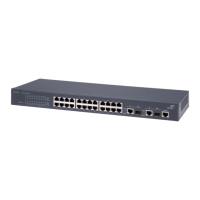1-13
Configuring Optional NTP Parameters
Table 1-13 Optional NTP parameters configuration tasks
Task Remarks
Configuring an Interface on the Local Switch to Send NTP messages Optional
Configuring the Number of Dynamic Sessions Allowed on the Local Switch Optional
Disabling an Interface from Receiving NTP messages Optional
Configuring an Interface on the Local Switch to Send NTP messages
Table 1-14 Configure an interface on the local switch to send NTP messages
Operation Command Description
Enter system view
system-view
—
Configure an interface on the
local switch to send NTP
messages
ntp-service source-interface
Vlan-interface vlan-id
Required
If you have specified an interface in the ntp-service unicast-server or ntp-service unicast-peer
command, this interface will be used for sending NTP messages.
Configuring the Number of Dynamic Sessions Allowed on the Local Switch
A single device can have a maximum of 128 associations at the same time, including static associations
and dynamic associations. A static association refers to an association that a user has manually created
by using an NTP command, while a dynamic association is a temporary association created by the
system during operation. A dynamic association will be removed if the system fails to receive messages
from it over a specific long time. In the server/client mode, for example, when you carry out a command
to synchronize the time to a server, the system will create a static association, and the server will just
respond passively upon the receipt of a message, rather than creating an association (static or
dynamic). In the symmetric mode, static associations will be created at the symmetric-active peer side,
and dynamic associations will be created at the symmetric-passive peer side; In the broadcast or
multicast mode, static associations will be created at the server side, and dynamic associations will be
created at the client side.
Table 1-15 Configure the number of dynamic sessions allowed on the local switch
Operation Command Description
Enter system view
system-view
—

